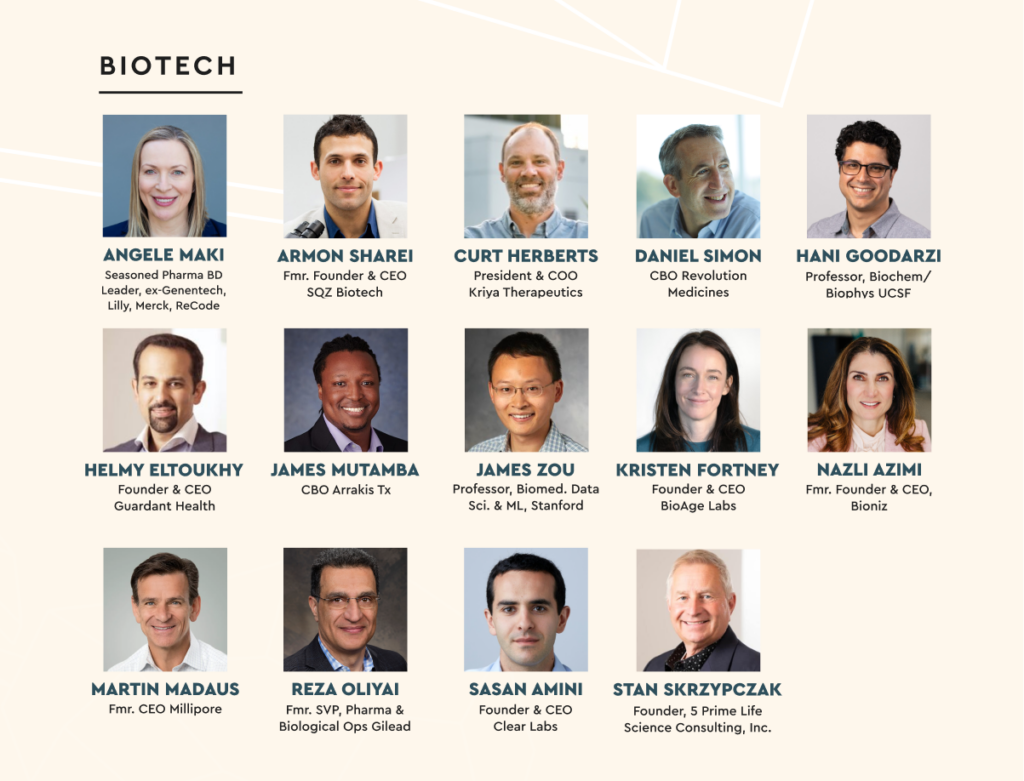Last week, Pear portfolio company BioAge Labs announced its $170M Series D round led by Sofinnova Investments, with participation from a strong syndicate of new investors including Longitude Capital, RA Capital, OrbiMed Advisors, RTW Investments, Eli Lilly, and Amgen, among others, in addition to many existing investors.
To mark this occasion, we wanted to share more about Pear’s partnership with BioAge Labs and its co-founders, Kristen Fortney (CEO) and Eric Morgen (COO).
Pear’s founders, Pejman and Mar, first met Kristen in 2015 through an introduction by another company founder associated with the Stanford Genome Technology Center. At that time, Kristen was a postdoc at Stanford in Professor Stuart Kim’s lab, where she studied the genetics of extreme human longevity. At the time, Kristen had published extensively in the space of genetics and longevity, but the company was merely an idea. She was pondering the question: could we use genetic information and new machine learning techniques to develop a therapy discovery platform for longevity? Kristen’s vision at the time was just as clear as it is today.
That year, Pear invested in BioAge’s initial seed financing, and we have gone on to successively back BioAge at every subsequent round, including the Series D.
As it’s not common for a seed-stage focused firm like ours to invest up until the Series D round, why have we continued to support BioAge?
Significant unmet need and large market opportunity in obesity and metabolic disease
The company’s lead drug program, azelaprag, addresses obesity and metabolic diseases. A staggering 40% of American adults are considered obese, and many suffer from a host of comorbidities including diabetes, heart disease, and stroke.
One of the most exciting recent medical advances has been the remarkable success of GLP-1 receptor agonist drugs in achieving dramatic weight loss in such patients, while still being generally safe and well tolerated.
With this drug class expected to eventually exceed $150 billion in sales annually, the top two developers, Eli Lilly and Novo Nordisk, have catapulted to become the first and second largest pharma companies by market capitalization (~$740B and $550B, respectively, as of mid-Feb. 2024).
As impressive as GLP-1 drugs are, one downside is that they can result in suboptimal body composition, in that they lead to the loss of both fat and muscle. BioAge’s preclinical studies have shown that azelaprag, which is a first-in-class oral apelin receptor agonist, can enhance body composition when combined with a GLP-1 drug. In a Phase 1b study sponsored by BioAge, azelaprag prevented muscle deterioration and promoted muscle metabolism in healthy older volunteers at bedrest.
A second limitation is that oral GLP-1 drugs have so far lagged behind the injectable versions in efficacy. Of course, most patients would strongly prefer orally dosed medications over injectables. In BioAge’s preclinical studies, azelaprag combined with a GLP-1 drug has been shown to double the weight loss achieved by the GLP-1 drug alone. Because it can be orally administered and has been well tolerated, azelaprag in combination with an oral GLP-1 drug may help to close this efficacy gap.
Human-first target discovery platform enabled by multi-omic analysis of aging human cohorts
BioAge didn’t initially begin with a focus on a lead therapeutic asset in obesity. In fact, BioAge started as a target discovery company within the longevity space, with the ambitious goal of understanding the biology of human aging in an effort to extend human lifespan and healthspan.
Although the longevity field has recently attracted much attention and investment, not all therapeutic strategies pursued have been equally scientifically rigorous. Many approaches rely on attempting to translate into humans tantalizing life extension or rejuvenation effects obtained in model organisms with very short lifespans like nematodes and mice.
But the biology of aging differs dramatically across species, and BioAge’s unique strategy was to partner with special biobanks that collected and stored blood from cohorts of people from middle age until death and that retained associated health records. By deploying multi-omics (primarily proteomics) and AI to interrogate the factors correlating with healthy human aging, the company generated unique insights into particular therapeutic targets of interest.
From this platform, one of the strongest targets that emerged was the peptide that azelaprag is designed to mimic – apelin. Exercise stimulates release of apelin from skeletal muscle into the blood, and in BioAge’s cohorts, middle-aged people with more apelin signaling were living longer, with better muscle function, and better brain function. Correspondingly, in mice, azelaprag protected elderly mice from muscle atrophy & preserved function in vivo.
Strong leadership team, advisors, and partners
As one might imagine, the team at BioAge has grown and matured substantially since inception in 2015. The leadership team today has world-class experience across biopharma. And in pursuing its Phase 2 study of azelaprag in combination with Eli Lilly’s GLP-1/GIP drug tirzepatide (Zepbound), BioAge will receive support from Eli Lilly’s Chorus organization, including the supply of tirzepatide and clinical trial design and execution expertise.
It’s certainly uncommon for a postdoc straight out of the lab to lead a therapeutics company until a Phase 2 clinical study. But as Kristen relayed during a fireside chat at our Pear office, she learned a lot about what she needed to know on the job progressively over time, and she was not afraid to surround herself with experts specializing in the many functional domains required to take a drug program from a target to the clinic.
This dedication to continual self-improvement and learning has been a hallmark of the many strong founders that we are fortunate to back at Pear. We are grateful that Kristen is helping to guide the next generation of such founders as part of our Pear Biotech Industry Advisory Council.

For these reasons, we remain excited to support BioAge Labs. We eagerly anticipate the results of its mid-stage clinical trials of azelaprag in obesity, as well as the development of additional programs nominated from its unique human aging target discovery platform.
